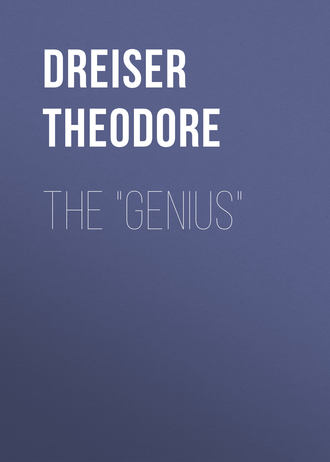 полная версия
полная версияThe "Genius"
"Look at me," she said once when he had dolefully commented upon the possibility of change. "Look straight into my eyes. What do you see?"
"Courage and determination," he said.
"What else?"
"Love."
"Do you think I will change?"
"No."
"Surely?"
"No."
"Well, look at me straight, Eugene. I won't. I won't, do you hear? I'm yours until you don't want me anymore. Now will you be happy?"
"Yes," he said.
"And when we get our studio," she went on.
"When we get our studio," he said, "we'll furnish it perfectly, and entertain a little after a while, maybe. You'll be my lovely Suzanne, my Flower Face, my Myrtle Blossom. Helen, Circe, Dianeme."
"I'll be your week-end bride," she laughed, "your odd or even girl, whichever way the days fall."
"If it only comes true," he exclaimed when they parted. "If it only does."
"Wait and see," she said. "Now you wait and see."
The days passed and Suzanne began what she called her campaign. Her first move was to begin to talk about the marriage question at the dinner table, or whenever she and her mother were alone, and to sound her on this important question, putting her pronouncements on record. Mrs. Dale was one of those empirical thinkers who love to philosophize generally, but who make no specific application of anything to their own affairs. On this marriage question she held most liberal and philosophic views for all outside her own immediate family. It was her idea, outside her own family, of course, that if a girl having reached maturity, and what she considered a sound intellectual majority, and who was not by then satisfied with the condition which matrimony offered, if she loved no man desperately enough to want to marry him and could arrange some way whereby she could satisfy her craving for love without jeopardizing her reputation, that was her lookout. So far as Mrs. Dale was concerned, she had no particular objection. She knew women in society, who, having made unfortunate marriages, or marriages of convenience, sustained some such relationship to men whom they admired. There was a subtle, under the surface understanding outside the society circles of the most rigid morality in regard to this, and there was the fast set, of which she was at times a welcome member, which laughed at the severe conventions of the older school. One must be careful – very. One must not be caught. But, otherwise, well, every person's life was a law unto him or herself.
Suzanne never figured in any of these theories, for Suzanne was a beautiful girl, capable of an exalted alliance, and her daughter. She did not care to marry her off to any wretched possessor of great wealth or title, solely for wealth's or title's sake, but she was hoping that some eligible young man of excellent social standing or wealth, or real personal ability, such, for instance, as Eugene possessed, would come along and marry Suzanne. There would be a grand wedding at a church of some prominence, – St. Bartholomew's, very likely; a splendid wedding dinner, oceans of presents, a beautiful honeymoon. She used to look at Suzanne and think what a delightful mother she would make. She was so young, robust, vigorous, able, and in a quiet way, passionate. She could tell when she danced how eagerly she took life. The young man would come. It would not be long. These lovely springtimes would do their work one of these days. As it was, there were a score of men already who would have given an eye to attract Suzanne's attention, but Suzanne would none of them. She seemed shy, coy, elusive, but above all, shy. Her mother had no idea of the iron will all this concealed any more than she had of the hard anarchic, unsocial thoughts that were surging in her daughter's brain.
"Do you think a girl ought to marry at all, mama?" Suzanne asked her one evening when they were alone together, "if she doesn't regard marriage as a condition she could endure all her days?"
"No-o," replied her mother. "What makes you ask?"
"Well, you see so much trouble among married people that we know. They're not very happy together. Wouldn't it be better if a person just stayed single, and if they found someone that they could really love, well, they needn't necessarily marry to be happy, need they?"
"What have you been reading lately, Suzanne?" asked her mother, looking up with a touch of surprise in her eyes.
"Nothing lately. What makes you ask?" said Suzanne wisely, noting the change in her mother's voice.
"With whom have you been talking?"
"Why, what difference does that make, mama? I've heard you express precisely the same views?"
"Quite so. I may have. But don't you think you're rather young to be thinking of things like that? I don't say all that I think when I'm arguing things philosophically. There are conditions which govern everything. If it were impossible for a girl to marry well, or if looks or lack of money interfered, – there are plenty of reasons – a thing like that might possibly be excusable, but why should you be thinking of that?"
"Why, it doesn't necessarily follow, mama, that because I am good looking, or have a little money, or am socially eligible, that I should want to get married. I may not want to get married at all. I see just as well as you do how things are with most people. Why shouldn't I? Do I have to keep away from every man, then?"
"Why, Suzanne! I never heard you argue like this before. You must have been talking with someone or reading some outré book of late. I wish you wouldn't. You are too young and too good looking to entertain any such ideas. Why, you can have nearly any young man you wish. Surely you can find someone with whom you can live happily or with whom you would be willing to try. It's time enough to think about the other things when you've tried and failed. At least you can give yourself ample time to learn something about life before you begin to talk such nonsense. You're too young. Why it's ridiculous."
"Mama," said Suzanne, with the least touch of temper, "I wish you wouldn't talk to me like that. I'm not a child any more. I'm a woman. I think like a woman – not like a girl. You forget that I have a mind of my own and some thoughts. I may not want to get married. I don't think I do. Certainly not to any of the silly creatures that are running after me now. Why shouldn't I take some man in an independent way, if I wish? Other women have before me. Even if they hadn't, it would be no reason why I shouldn't. My life is my own."
"Suzanne Dale!" exclaimed her mother, rising, a thrill of terror passing along her heartstrings. "What are you talking about? Are you basing these ideas on anything I have said in the past? Then certainly my chickens are coming home to roost early. You are in no position to consider whether you want to get married or not. You have seen practically nothing of men. Why should you reach any such conclusions now? For goodness' sake, Suzanne, don't begin so early to meditate on these terrible things. Give yourself a few years in which to see the world. I don't ask you to marry, but you may meet some man whom you could love very much, and who would love you. If you were to go and throw yourself away under some such silly theory as you entertain now, without stopping to see, or waiting for life to show you what it has in store, what will you have to offer him. Suzanne, Suzanne" – Suzanne was turning impatiently to a window – "you frighten me! There isn't, there couldn't be. Oh, Suzanne, I beg of you, be careful what you think, what you say, what you do! I can't know all your thoughts, no mother can, but, oh, if you will stop and think, and wait a while!"
She looked at Suzanne who walked to a mirror and began to fix a bow in her hair.
"Mama," she said calmly. "Really, you amuse me. When you are out with people at dinner, you talk one way, and when you are here with me, you talk another. I haven't done anything desperate yet. I don't know what I may want to do. I'm not a child any more, mama. Please remember that. I'm a woman grown, and I certainly can lay out my life for myself. I'm sure I don't want to do what you are doing – talk one thing and do another."
Mrs. Dale recoiled intensely from this stab. Suzanne had suddenly developed in the line of her argument a note of determination, frank force and serenity of logic which appalled her. Where had the girl got all this? With whom had she been associating? She went over in her mind the girls and men she had met and known. Who were her intimate companions? – Vera Almerding; Lizette Woodworth; Cora TenEyck – a half dozen girls who were smart and clever and socially experienced. Were they talking such things among themselves? Was there some man or men unduly close to them? There was one remedy for all this. It must be acted on quickly if Suzanne were going to fall in with and imbibe any such ideas as these. Travel – two or three years of incessant travel with her, which would cover this dangerous period in which girls were so susceptible to undue influence was the necessary thing. Oh, her own miserable tongue! Her silly ideas! No doubt all she said was true. Generally it was so. But Suzanne! Her Suzanne, never! She would take her away while she had time, to grow older and wiser through experience. Never would she be permitted to stay here where girls and men were talking and advocating any such things. She would scan Suzanne's literature more closely from now on. She would viser her friendships. What a pity that so lovely a girl must be corrupted by such wretched, unsocial, anarchistic notions. Why, what would become of her girl? Where would she be? Dear Heaven!
She looked down in the social abyss yawning at her feet and recoiled with horror.
Never, never, never! Suzanne should be saved from herself, from all such ideas now and at once.
And she began to think how she could introduce the idea of travel easily and nicely. She must lure Suzanne to go without alarming her – without making her think that she was bringing pressure to bear. But from now on there must be a new order established. She must talk differently; she must act differently. Suzanne and all her children must be protected against themselves and others also. That was the lesson which this conversation taught her.
CHAPTER XIII
Eugene and Angela had been quarreling between themselves most bitterly; at other times Angela was attempting to appeal to his sense of justice and fair play, if not his old-time affection, in the subtlest of ways. She was completely thrown out of her old methods of calculation, and having lost those had really no traditions on which to proceed. Eugene had always heretofore apparently feared her wrath; now he cared nothing for that. He had been subject, in times past, to a certain extent to those alluring blandishments which the married will understand well enough, but these were as ashes. Her charms meant nothing to him. She had hoped that the thought of a coming child would move him, but no, it was apparently without avail. Suzanne seemed a monster to her now since she did not desert him, and Eugene a raving maniac almost, and yet she could see how human and natural it all was. He was hypnotized, possessed. He had one thought, Suzanne, Suzanne, and he would fight her at every turn for that. He told her so. He told her of her letter to Suzanne, and the fact that he had read and destroyed it. It did not help her cause at all. She knew that she had decried him. He stood his ground solidly, awaiting the will of Suzanne, and he saw Suzanne frequently, telling her that he had won completely, and that the fulfilment of their desires now depended upon her.
As has been said, Suzanne was not without passion. The longer she associated with Eugene, the more eager she became for that joyous fulfilment which his words, his looks, his emotions indicated. In her foolish, girlish way, she had built up a fancy which was capable of realization only by the most ruthless and desperate conduct. Her theory of telling her mother and overcoming her by argument or defiance was really vain, for it could not be settled so easily, or so quickly. Because of her mother's appeal to her in this first conversation, she fancied she had won a substantial victory. Her mother was subject to her control and could not defeat her in argument. By the latter token she felt she was certain to win. Besides, she was counting heavily on her mother's regard for Eugene and her deep affection for herself. Hitherto, her mother had really refused her nothing.
The fact that Eugene did not take her outright at this time, – postponing until a more imperative occasion an adjustment of the difficulties which must necessarily flow from their attempted union without marriage – was due to the fact that he was not as desperate or as courageous as he appeared to be. He wanted her, but he was a little afraid of Suzanne herself. She was doubtful, anxious to wait, anxious to plan things her own way. He was not truly ruthless ever, but good natured and easy going. He was no subtle schemer and planner, but rather an easy natured soul, who drifted here and there with all the tides and favorable or unfavorable winds of circumstance. He might have been ruthless if he had been eager enough for any one particular thing on this earth, money, fame, affection, but at bottom, he really did not care as much as he thought he did. Anything was really worth fighting for if you had to have it, but it was not worth fighting for to the bitter end, if you could possibly get along without it. Besides, there was nothing really one could not do without, if one were obliged. He might long intensely, but he could survive. He was more absorbed in this desire than in anything else in his history, but he was not willing to be hard and grasping.
On the other hand, Suzanne was willing to be taken, but needed to be pressed or compelled. She imagined in a vague way that she wanted to wait and adjust things in her own way, but she was merely dreaming, procrastinating because he was procrastinating. If he had but compelled her at once she would have been happy, but he was sadly in need of that desperate energy that acts first and thinks afterward. Like Hamlet, he was too fond of cogitating, too anxious to seek the less desperate way, and in doing this was jeopardizing that ideal bliss for which he was willing to toss away all the material advantages which he had thus far gained.
When Mrs. Dale quite casually within a few days began to suggest that they leave New York for the fall and winter, she, Suzanne and Kinroy, and visit first England, then Southern France and then Egypt, Suzanne immediately detected something intentional about it, or at best a very malicious plan on the part of fate to destroy her happiness. She had been conjecturing how, temporarily, she could avoid distant and long drawn out engagements which her mother not infrequently accepted for herself and Suzanne outside New York, but she had not formulated a plan. Mrs. Dale was very popular and much liked. This easy suggestion, made with considerable assurance by her mother, and as though it would be just the thing, frightened and then irritated Suzanne. Why should her mother think of it just at this time?
"I don't want to go to Europe," she said warily. "We were over there only three years ago. I'd rather stay over here this winter and see what's going on in New York."
"But this trip will be so delightful, Suzanne," her mother insisted. "The Camerons are to be at Callendar in Scotland for the fall. They have taken a cottage there. I had a note from Louise, Tuesday. I thought we might run up there and see them and then go to the Isle of Wight."
"I don't care to go, mama," replied Suzanne determinedly. "We're settled here comfortably. Why do you always want to be running off somewhere?"
"Why, I'm not running – how you talk, Suzanne! I never heard you object very much to going anywhere before. I should think Egypt and the Riviera would interest you very much. You haven't been to either of these places."
"I know they're delightful, but I don't care to go this fall. I'd rather stay here. Why should you suddenly decide that you want to go away for a year?"
"I haven't suddenly decided," insisted her mother. "I've been thinking of it for some time, as you know. Haven't I said that we would spend a winter in Europe soon? The last time I mentioned it, you were very keen for it."
"Oh, I know, mama, but that was nearly a year ago. I don't want to go now. I would rather stay here."
"Why would you? More of your friends go away than remain. I think a particularly large number of them are going this winter."
"Ha! Ha! Ho! Ho!" laughed Suzanne. "A particularly large number. How you exaggerate, mama, when you want anything. You always amuse me. It's a particularly large number now, just because you want to go," and she laughed again.
Suzanne's defiance irritated her mother. Why should she suddenly take this notion to stay here? It must be this group of girls she was in with, and yet, Suzanne appeared to have so few intimate girl friends. The Almerdings were not going to stay in town all the winter. They were here now because of a fire at their country place, but it would only be for a little while. Neither were the TenEycks. It couldn't be that Suzanne was interested in some man. The only person she cared much about was Eugene Witla, and he was married and only friendly in a brotherly, guardian-like way.
"Now, Suzanne," she said determinedly, "I'm not going to have you talk nonsense. This trip will be a delightful thing for you once you have started. It's useless for you to let a silly notion like not wanting to go stand in your way. You are just at the time when you ought to travel. Now you had better begin to prepare yourself, for we're going."
"Oh, no, I'm not, mama," said Suzanne. "Why, you talk as though I were a very little girl. I don't want to go this fall and I'm not going. You may go if you want to, but I'm not going."
"Why, Suzanne Dale!" exclaimed her mother. "Whatever has come over you? Of course you'll go. Where would you stay if I went? Do you think I would walk off and leave you? Have I ever before?"
"You did when I was at boarding school," interrupted Suzanne.
"That was a different matter. Then you were under proper supervision. Mrs. Hill was answerable to me for your care. Here you would be alone. What do you think I would be doing?"
"There you go, mama, talking as though I was a little girl again. Will you please remember that I am nearly nineteen? I know how to look after myself. Besides, there are plenty of people with whom I might stay if I chose."
"Suzanne Dale, you talk like one possessed. I'll listen to nothing of the sort. You are my daughter, and as such, subject to my guardianship. Of what are you thinking? What have you been reading? There's some silly thing at the bottom of all this. I'll not go away and leave you and you will come with me. I should think that after all these years of devotion on my part, you would take my feelings into consideration. How can you stand there and argue with me in this way?"
"Arguing, mama?" asked Suzanne loftily. "I'm not arguing. I'm just not going. I have my reasons for not wanting to go, and I'm not going, that's all! Now you may go if you want to."
Mrs. Dale looked into Suzanne's eyes and saw for the first time a gleam of real defiance in them. What had brought this about? Why was her daughter so set – of a sudden, so stubborn and hard? Fear, anger, astonishment, mingled equally in her feelings.
"What do you mean by reasons?" asked her mother. "What reasons have you?"
"A very good one," said Suzanne quietly, twisting it to the singular.
"Well, what is it then, pray?"
Suzanne debated swiftly and yet a little vaguely in her own mind. She had hoped for a longer process of philosophic discussion in which to entrap her mother into some moral and intellectual position from which she could not well recede, and by reason of which she would have to grant her the license she desired. From one remark and another dropped in this and the preceding conversation, she realized that her mother had no logical arrangement in her mind whereby she included her in her philosophical calculations at all. She might favor any and every theory and conclusion under the sun, but it would mean nothing in connection with Suzanne. The only thing that remained, therefore, was to defy her, or run away, and Suzanne did not want to do the latter. She was of age. She could adjust her own affairs. She had money. Her mental point of view was as good and sound as her mother's. As a matter of fact, the latter's attitude, in view of Suzanne's recent experience and feelings, seemed weak and futile. What did her mother know of life any more than she? They were both in the world, and Suzanne felt herself to be the stronger – the sounder of the two. Why not tell her now and defy her. She would win. She must. She could dominate her mother, and this was the time to do it.
"Because I want to stay near the man I love," she finally volunteered quietly.
Mrs. Dale's hand, which had been elevated to a position of gesticulation before her, dropped limp, involuntarily, to her side. Her mouth opened the least bit. She stared in a surprised, anguished, semi-foolish way.
"The man you love, Suzanne?" she asked, swept completely from her moorings, and lost upon a boundless sea. "Who is he?"
"Mr. Witla, mama – Eugene. I love him and he loves me. Don't stare, mama. Mrs. Witla knows. She is willing that we should have each other. We love each other. I am going to stay here where I can be near him. He needs me."
"Eugene Witla!" exclaimed her mother, breathless, a look of horror in her eyes, cold fright in her tense hands. "You love Eugene Witla? a married man! He loves you! Are you talking to me? Eugene Witla!! You love him! Why I can't believe this. I'm not in my right mind. Suzanne Dale, don't stand there! Don't look at me like that! Are you telling me, your mother? Tell me it isn't so! Tell me it isn't so before you drive me mad! Oh, great Heavens, what am I coming to? What have I done? Eugene Witla of all men! Oh, God, oh, God, oh, God!"
"Why do you carry on so, mama?" asked Suzanne calmly. She had expected some such scene as this – not quite so intense, so hysterical, but something like it, and was, in a way, prepared for it. A selfish love was her animating, governing impulse – a love also that stilled self, and put aside as nothing all the world and its rules. Suzanne really did not know what she was doing. She was hypnotized by the sense of perfection in her lover, the beauty of their love. Not practical facts but the beauty of the summer, the feel of cool winds, the glory of skies and sunlight and moonlight, were in her mind. Eugene's arms about her, his lips to hers, meant more than all the world beside. "I love him. Of course, I love him. What is there so strange about that?"
"What is strange? Are you in your right mind? Oh, my poor, dear little girl! My Suzanne! Oh, that villain! That scoundrel! To come into my house and make love to you, my darling child! How should you know? How could I expect you to understand? Oh, Suzanne! for my sake, for the love of Heaven, hush! Never breathe it! Never say that terrible thing to me again! Oh, dear! Oh, dear! Oh, dear!!! That I should live to see this! My child! My Suzanne! My lovely, beautiful Suzanne! I shall die unless I can stop this! I shall die! I shall die!"
Suzanne stared at her mother quite astonished at the violent emotion into which she had cast her. Her pretty eyes were open wide, her eyebrows elevated, her lips parted sweetly. She was a picture of intense classic beauty, chiseled, peaceful, self-possessed. Her brow was as smooth as marble, her lips as arched as though they had never known one emotion outside joy. Her look was of a quizzical, slightly amused, but not supercilious character which made her more striking than ever if possible.
"Why, mama! You think I am a child, don't you? All that I say to you is true. I love Eugene. He loves me. I am going to live with him as soon as it can be quietly arranged. I wanted to tell you because I don't want to do anything secretly, but I propose to do it. I wish you wouldn't insist on looking on me as a baby, mama. I know what I am doing. I have thought it all out this long time."
"Thought it all out!" pondered Mrs. Dale. "Going to live with him when it can be arranged! Is she talking of living with a man without a wedding ceremony being performed? With a man already married! Is the child stark mad? Something has turned her brain. Surely something has. This is not my Suzanne – my dear, lovely, entrancing Suzanne."









